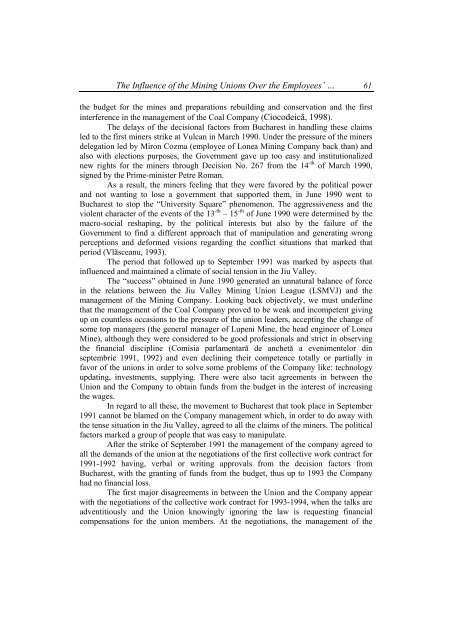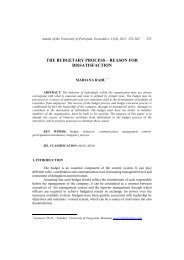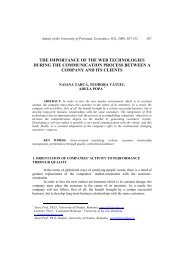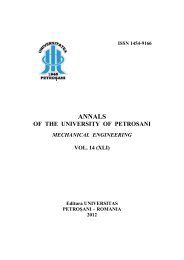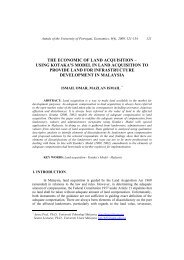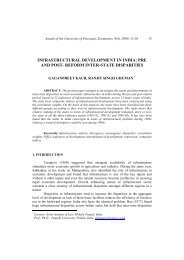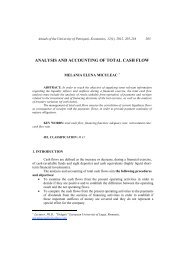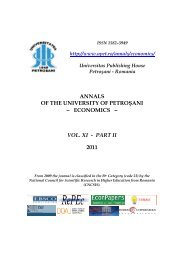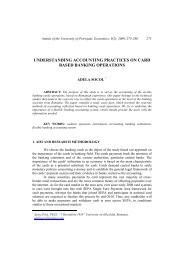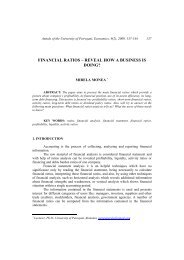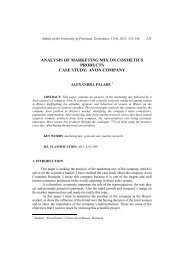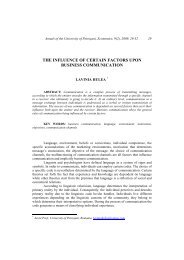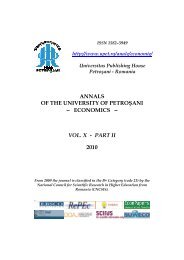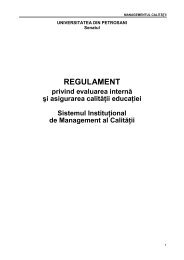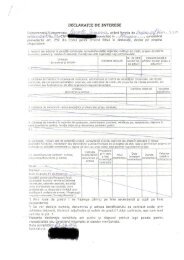annals of the university of petroÅani â¼ economics â¼ vol. xi - part i ...
annals of the university of petroÅani â¼ economics â¼ vol. xi - part i ...
annals of the university of petroÅani â¼ economics â¼ vol. xi - part i ...
Create successful ePaper yourself
Turn your PDF publications into a flip-book with our unique Google optimized e-Paper software.
The Influence <strong>of</strong> <strong>the</strong> Mining Unions Over <strong>the</strong> Employees’ … 61<br />
<strong>the</strong> budget for <strong>the</strong> mines and preparations rebuilding and conservation and <strong>the</strong> first<br />
interference in <strong>the</strong> management <strong>of</strong> <strong>the</strong> Coal Company (Ciocodeică, 1998).<br />
The delays <strong>of</strong> <strong>the</strong> decisional factors from Bucharest in handling <strong>the</strong>se claims<br />
led to <strong>the</strong> first miners strike at Vulcan in March 1990. Under <strong>the</strong> pressure <strong>of</strong> <strong>the</strong> miners<br />
delegation led by Miron Cozma (employee <strong>of</strong> Lonea Mining Company back than) and<br />
also with elections purposes, <strong>the</strong> Government gave up too easy and institutionalized<br />
new rights for <strong>the</strong> miners through Decision No. 267 from <strong>the</strong> 14 -th <strong>of</strong> March 1990,<br />
signed by <strong>the</strong> Prime-minister Petre Roman.<br />
As a result, <strong>the</strong> miners feeling that <strong>the</strong>y were favored by <strong>the</strong> political power<br />
and not wanting to lose a government that supported <strong>the</strong>m, in June 1990 went to<br />
Bucharest to stop <strong>the</strong> “University Square” phenomenon. The aggressiveness and <strong>the</strong><br />
violent character <strong>of</strong> <strong>the</strong> events <strong>of</strong> <strong>the</strong> 13 -th – 15 -th <strong>of</strong> June 1990 were determined by <strong>the</strong><br />
macro-social reshaping, by <strong>the</strong> political interests but also by <strong>the</strong> failure <strong>of</strong> <strong>the</strong><br />
Government to find a different approach that <strong>of</strong> manipulation and generating wrong<br />
perceptions and deformed visions regarding <strong>the</strong> conflict situations that marked that<br />
period (Vlãsceanu, 1993).<br />
The period that followed up to September 1991 was marked by aspects that<br />
influenced and maintained a climate <strong>of</strong> social tension in <strong>the</strong> Jiu Valley.<br />
The “success” obtained in June 1990 generated an unnatural balance <strong>of</strong> force<br />
in <strong>the</strong> relations between <strong>the</strong> Jiu Valley Mining Union League (LSMVJ) and <strong>the</strong><br />
management <strong>of</strong> <strong>the</strong> Mining Company. Looking back objectively, we must underline<br />
that <strong>the</strong> management <strong>of</strong> <strong>the</strong> Coal Company proved to be weak and incompetent giving<br />
up on countless occasions to <strong>the</strong> pressure <strong>of</strong> <strong>the</strong> union leaders, accepting <strong>the</strong> change <strong>of</strong><br />
some top managers (<strong>the</strong> general manager <strong>of</strong> Lupeni Mine, <strong>the</strong> head engineer <strong>of</strong> Lonea<br />
Mine), although <strong>the</strong>y were considered to be good pr<strong>of</strong>essionals and strict in observing<br />
<strong>the</strong> financial discipline (Comisia parlamentarã de anchetă a evenimentelor din<br />
septembrie 1991, 1992) and even declining <strong>the</strong>ir competence totally or <strong>part</strong>ially in<br />
favor <strong>of</strong> <strong>the</strong> unions in order to solve some problems <strong>of</strong> <strong>the</strong> Company like: technology<br />
updating, investments, supplying. There were also tacit agreements in between <strong>the</strong><br />
Union and <strong>the</strong> Company to obtain funds from <strong>the</strong> budget in <strong>the</strong> interest <strong>of</strong> increasing<br />
<strong>the</strong> wages.<br />
In regard to all <strong>the</strong>se, <strong>the</strong> movement to Bucharest that took place in September<br />
1991 cannot be blamed on <strong>the</strong> Company management which, in order to do away with<br />
<strong>the</strong> tense situation in <strong>the</strong> Jiu Valley, agreed to all <strong>the</strong> claims <strong>of</strong> <strong>the</strong> miners. The political<br />
factors marked a group <strong>of</strong> people that was easy to manipulate.<br />
After <strong>the</strong> strike <strong>of</strong> September 1991 <strong>the</strong> management <strong>of</strong> <strong>the</strong> company agreed to<br />
all <strong>the</strong> demands <strong>of</strong> <strong>the</strong> union at <strong>the</strong> negotiations <strong>of</strong> <strong>the</strong> first collective work contract for<br />
1991-1992 having, verbal or writing approvals from <strong>the</strong> decision factors from<br />
Bucharest, with <strong>the</strong> granting <strong>of</strong> funds from <strong>the</strong> budget, thus up to 1993 <strong>the</strong> Company<br />
had no financial loss.<br />
The first major disagreements in between <strong>the</strong> Union and <strong>the</strong> Company appear<br />
with <strong>the</strong> negotiations <strong>of</strong> <strong>the</strong> collective work contract for 1993-1994, when <strong>the</strong> talks are<br />
adventitiously and <strong>the</strong> Union knowingly ignoring <strong>the</strong> law is requesting financial<br />
compensations for <strong>the</strong> union members. At <strong>the</strong> negotiations, <strong>the</strong> management <strong>of</strong> <strong>the</strong>


